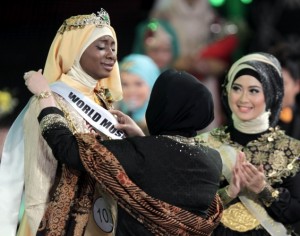This post was written by guest contributor Nicole Hunter Mostafa (@nicolejhm).
When I think about topics that are directly relevant to the lives of Muslim women, one that would probably be pretty low on my list is beauty pageants. Sure, in terms of feminist discourse, it’s not that hard to make the connection—beauty pageants’ primary goal is to make judgments about women based primarily on how they look, while media coverage of Muslim women, even when ostensibly regarding other subjects, still holds a primary focus on (you guessed it) how they look.

First, there was the Miss World Muslimah pageant, held in Jakarta, Indonesia on September 18, 2013. Contestants were judged on their religious knowledge and piety…and although one of the goals of the pageant is the “empowerment” of Muslim women, one of the primary judging criteria was, of course, how the contestants looked in their spangly hijabs. Which, when it comes right down to it, doesn’t seem all that different from a traditional beauty pageant, no?
In any case, Miss Nigeria, Obabiyi Aishah Ajibola, took home the Miss World Muslimah crown, in a tearful crowning ceremony that looked a lot like Miss America’s, just with a hijab. She won, among other prizes, a trip to Makkah.
In addition to the Miss World Muslimah pageant, there was the Miss America pageant, held in Atlantic City, New Jersey. There were no Muslim women in the Miss America pageant. And of course, a Muslim woman didn’t win. And yet, when the winner was announced, the discussion still managed to turn to Muslim women.
See, the winner of Miss America, Nina Davuluri of New York, is of Indian descent. For her talent, she performed a Bollywood dance routine. She is not Muslim. And yet, when she was crowned, Twitter erupted. She was called “Miss Terrorist.” Some expressed sadness or outrage that “an Arab” was crowned Miss America so close to the anniversary of the 9-11 attacks. (Because as we all know, if we’re going to allocate blame for the 9-11 attacks, Bollywood should be at the top of the list.)
Goodness. Muslim women really can’t win, even when we don’t win. Nina Davuluri isn’t Muslim, but considering how Muslim women are so often represented in the media as oppressed, you’d think that those Miss America watchers who didn’t get the memo that brown Bollywood fan does not equal Muslim (or Arab, for that matter) would be thrilled that a Muslim woman had broken out of whatever oppressive box all Muslim women are supposedly trapped in. Look, she’s wearing a bikini! She speaks perfect English! She’s educated! Isn’t she what so many people think Muslim women should be (even though, you know, she’s not Muslim)?
Yeah, whatever, Miss Al Qaeda (yes, that slur showed up in a tweet). Stephen Colbert lampooned the controversy on his show, explaining that 705 tweets showed up with some combination of the words “Miss America terrorist,” and, while pointing to a photo of Davuluri walking across the stage in a bikini, he joked in response, “705 people saw a woman in a bikini and thought, ‘Muslim extremist.’”
It was one of the rare moments in the history of The Colbert Report when Stephen Colbert couldn’t stop himself from laughing at the joke right along with the audience.
It seems like this year’s round of major beauty pageants was a step backward all around, not just for Muslim women, but for all women. A generation ago, many American families would gather around the television to watch the Miss America pageant (heck, I remember doing that when I was a kid). No more. Beauty pageants are more often fodder for water cooler gossip within the context of last night’s episode of Toddlers & Tiaras rather than last night’s Miss America pageant. The winner gets some press on the morning after the pageant, but other than that, we generally don’t pay much mind to Miss America anymore. Girls are more likely to aspire to President when they grow up.
Yet this year, because of racism and Islamophobia, as a culture we’ve gone from pretty much ignoring beauty pageants to defending their judgment. Even among the supposedly progressive pieces that defend Davuluri’s win and (correctly) point out that even if she were Muslim, of Arabic descent, or both, she’s still American and therefore still has just as much right to serve as Miss America as Miss Kansas, many ignore that hey, beauty pageants are tremendously sexist and essentially reduce a woman’s value to how she looks in a bikini and heels (or, in the case of Miss World Muslimah, a jalabiya and hijab). (Miss Kansas, by the way, is Theresa Vail, a white woman who is a sergeant in the U.S. Army, loves to hunt, became perhaps the first Miss America contestant to show off her tattoos in the swimsuit competition, and was the People’s Choice for the title, although she didn’t even make it into the top ten. Many tweets expressed dismay that Vail, a “real American,” did not win.)
Yes, despite all the crowns being handed out, it seems like this year, in some way or another, everyone lost. We can say that it’s a step forward that Nina Davuluri won Miss America, because hey, at least she beat out Miss Kansas to do it, right? Isn’t that evidence that Miss America is making progress by embracing diversity?
Perhaps. But even so, it’s still a one step forward, three steps back kind of deal. The real progress will be made when women aren’t reduced to being judged on how they look in a bikini in order to finance medical school…or on how they look in a hijab in order to finance their umrah.











